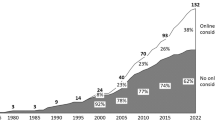Abstract
Since its publication in 1985 Paul David's “Economics of QWERTY” has provided a paradigm case for the understanding and application of path-dependent processes in economics, some of which have been identified as yielding sub-optimal outcomes. The accuracy and relevance of this case, and this entire theoretical approach, has been subjected to critical scrutiny by Stan Liebowitz and Stephen Margolis in a series of articles and in a recent book. In this article I provide a wide ranging, and largely appreciative, review of the book and highlight, in some detail, the fundamental disagreements with which it deals.
Similar content being viewed by others
References
Arthur, W. B. (1983) “On Competing Technologies and Historical Small Events: The Dynamics of Choice Under Increasing Returns.” Technological Innovation Program Workshop Paper, Department of Economics, Stanford University, November.
Arthur, W. B. (1989) “Competing Technologies, Increasing Returns, and Lock-in by Historical Events.” Economic Journal, 99: 116–131.
Boettke, P. J. (1996) “What is Wrong With Neoclassical Economics (and What is Still Wrong With Austrian Economics)?” In: Foldvary, F. E. (ed.) Beyond Neoclassical Economics Aldershot: Edward Elgar.
Coase, R. H. (1960) “The Problem of Social Cost.” Journal of Law and Economics, 3: 1–44.
Dahlman, C. (1979) “The Problem of Externality.” Journal of Law and Economics, 17: 357–376.
David, P. A. (1985) “Clio and the Economics of QWERTY.” American Economic Review, 75: 332–337.
David, P. A. (1986) “Understanding the Economics of QWERTY: The Necessity of History.” In: Parker, W. N. (ed.) Economic History and the Modern Economist. New York: Basil Blackwell.
David, P. A. (1997a) “Path Dependence and the Quest for Historical Economics: One More Chorus of the Ballad of QWERTY.” University of Oxford, Discussion Papers in Economic and Social History, November 20, 1997, http://www.nuff.ox.ac.uk/economics/history/paper20/david3.pdf.
David, P. A. (1997b) “Path Dependence, Its Critics, and the Quest for ‘Historical Economics’: Keynote Address to the European Association for Evolutionary Political Economy.” Athens Meetings, 7–9 November 1997.
David, P. A. (1999a) “Myth'-Informing The Public About Public Goods and QWERTY.” http://www.eh.net/ehnet/Archives/eh.res/apr-1999/0006.html.
David, P. A. (1999b) “At last, a Remedy for Chronic QWERTY-skepticism!” Prepared for Presentation at the European Summer School in Industrial Dynamics (ESSID), held at l'Institute d'Etudes Scientifique de Cargese (Corse), France, 5th–12th September 1999, http://www.eh.net/Publications/remedy.shtml.
Farrell, J., and Saloner, G. (1992) “Converters, Compatibility and Control of Interfaces.” The Journal of Industrial Economics. XL: 9–36.
Gilbert, R. J. (1992) “Symposium on Compatibility: Incentives and Market Structure.” The Journal of Industrial Economics, XL: 1–8.
Hayek, F. A. (1978) “Competition as a Discovery Procedure.” In: New Studies in Philosophy, Politics and Economics and the History of Ideas. London: Routledge.
Hayek, F. A. (1988) The Fatal Conceit: The Errors of Socialism. Chicago: University of Chicago Press.
Katz, M. L., and Shapiro, C. (1983) “Network Externalities, Competition and Compatibility.” Woodrow Wilson School Discussion Paper in Economics No. 54, Princeton University, September.
Katz, M. L., and Shapiro, C. (1992) “Product Introduction with Network Externalities.” The Journal of Industrial Economics, XL: 55–84.
Lewin, P. (1997) “Hayekian Equilibrium and Change.” Journal of Economic Methodology, 4: 245–266.
Lewin, P. (1999) Capital in Disequilibrium: The Role of Capital in a Changing World. New York and London: Routledge.
Liebowitz, S. J., and Margolis, S. E. (1990) “The Fable of the Keys.” Journal of Law and Economics, 33: 1–25.
Liebowitz, S. J., and Margolis, S. E. (1994) “Network Externality: An Uncommon Tragedy.” Journal of Economic Perspectives, 8: 133–150.
Liebowitz, S. J., and Margolis, S. E. (1995a) “Are Network Externalities a New Source of Market Failure?” Research in Law and Economics, 17: 1–22.
Liebowitz, S. J., and Margolis, S. E. (1995b) “Path Dependence, Lock-in, and History.” Journal of Law Economics and Organization, 11: 205–226.
Liebowitz, S. J., and Margolis, S. E. (1996) “Should Technology Choice be a Concern for Antitrust?” Harvard Journal of Law and Technology, 9: 283–318.
Liebowitz, S. J., and Margolis, S. E. (1998a) “Path Dependence.” Entry in The New Palgrave Dictionary of Economics and Law, Newman, Peter (ed.) London: Macmillan, 17–23.
Liebowitz, S. J., and Margolis, S. E. (1998b) “Network Externalities (Effects).” Entry in The New Palgrave Dictionary of Economics and Law, Newman, Peter (ed.) London: Macmillan, 671–675.
Liebowitz, S. J., and Margolis, S. E. (1998c) “Dismal Science Fictions: Network-effects, Microsoft, and Antitrust Speculation.” Washington D.C., Cato Institute, Policy Analysis #324.
Liebowitz, S. J., and Margolis, S. E. (1999) Winners, Losers & Microsoft: Competition and Antitrust in High Technology. Oakland: The Independent Institute.
McCloskey, D. N. (1999) http://www.eh.net/ehnet/Archives/eh.res/apr-1999/0005.html.
Machovec, F. M. (1995) Perfect Competition and the Transformation of Economics. London and New York: Routledge.
Mishan, E. J. (1975) “The Folklore of the Market.” Journal of Economic Issues, 9: 690–720.
North, D. C. (1990) Institutions, Institutional Change and Economics Performance. Cambridge: Cambridge University Press.
Puffert, D. J. (1999) “Path Dependence in Economic History.” www.vwl.uni-muenchen.de/ls komlos/pathe.pdf.
Teece, D. J., and Coleman, M. (1998) “The Meaning of Monopoly: Antitrust Analysis in High-Technology Industries.” The Antitrust Bulletin. Fall–Winter: 801–857.
Yamada, H. (1980) “A Historical Study of Typewriters and Typing Methods from the Position of Planning Japanese Parallels.” Journal of Information Processing, 2: 175–202.
Yamada, H. (1983) “Certain Problems Associated with the Design of Input Keyboards for Japanese Writing.” In: Cooper, W. E. (ed.) Cognitive Aspects of Skilled Typewriting. New York: Springer.
Author information
Authors and Affiliations
Rights and permissions
About this article
Cite this article
Lewin, P. The Market Process and the Economics of QWERTY: Two Views. The Review of Austrian Economics 14, 65–96 (2001). https://doi.org/10.1023/A:1007811722566
Issue Date:
DOI: https://doi.org/10.1023/A:1007811722566




